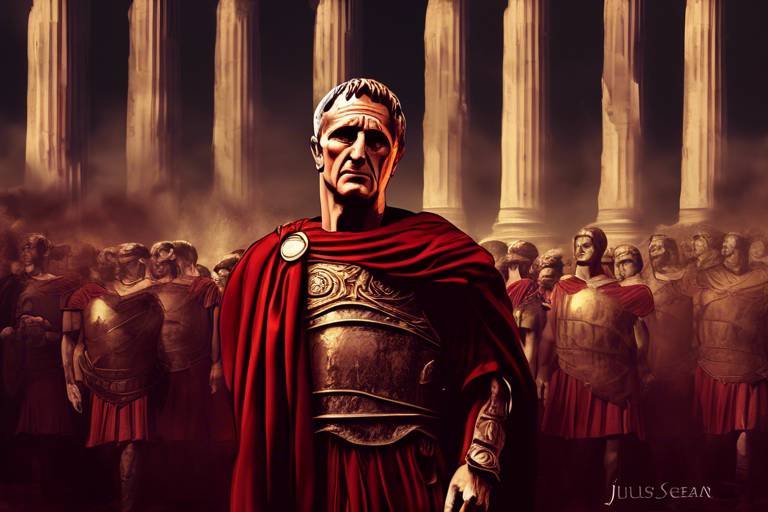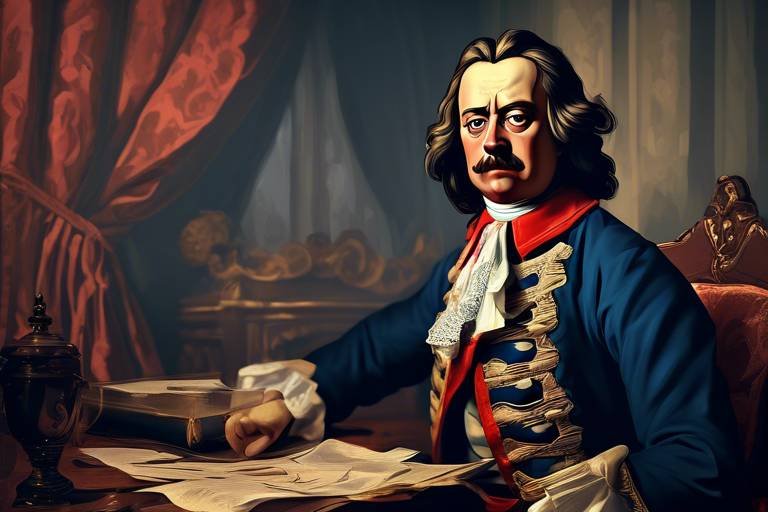Julius Caesar: The Rise and Fall of a Roman Leader
Julius Caesar, a name that resonates through the annals of history, embodies the epitome of power, ambition, and tragedy. From his humble beginnings in Rome to his ultimate demise, Caesar's life is a tapestry woven with conquests, betrayals, and enduring legacies that continue to shape our world today.
As a young man, Caesar's path was paved with privilege and expectation. Born into a patrician family, he displayed early signs of leadership and charisma that would later propel him to the pinnacle of Roman politics. His education and upbringing, steeped in the traditions of the Republic, nurtured a mind destined for greatness.
But it was on the battlefield where Caesar truly shone. His military campaigns in Gaul and Britain were not mere conquests; they were symphonies of strategy and valor, each victory expanding Rome's domain and solidifying his reputation as an unparalleled general. The world trembled at the mere mention of his name, a testament to his military prowess.
Ascending the political echelons, Caesar navigated the treacherous waters of Roman politics with finesse and ruthlessness. His declaration of dictatorship for life marked a seismic shift in the Republic's governance, ushering in an era of authoritarian rule that would forever alter the course of Roman history. The Senate quaked in his shadow, powerless against his iron will.
Yet, power breeds envy, and betrayal lurked in the shadows. The fateful Ides of March saw Caesar fall at the hands of his closest allies, the knives of Brutus and Cassius sealing his tragic fate. The echoes of his assassination reverberated across Rome, a thunderclap that heralded the end of an era and the birth of a new order.
Despite his untimely demise, Caesar's legacy endured, a phoenix rising from the ashes of his demise. His reforms, from the Julian Calendar to the expansion of citizenship, reshaped Roman society and governance, laying the foundation for a new era of prosperity and stability. His vision, though stained with blood, bore fruit that would endure for centuries.
Amidst the tumult of politics and war, Caesar found solace in the arms of Cleopatra, the enigmatic Queen of Egypt. Their union, both political and personal, sparked intrigue and scandal across the ancient world, a love story that transcended empires and defied convention. Theirs was a bond forged in fire, destined to burn bright and fade into legend.
And so, William Shakespeare immortalized Caesar in his timeless play, a tale of ambition, betrayal, and the inexorable march of fate. Through the Bard's words, we glimpse the man behind the legend, his flaws and virtues laid bare for all to see. Shakespeare's portrayal of Caesar endures, a mirror held up to the complexities of power and the fragility of greatness.

Early Life of Julius Caesar
Julius Caesar, born into a patrician family in Rome, was destined for greatness from an early age. His upbringing instilled in him the values of honor, courage, and ambition, setting the stage for his future as a prominent Roman figure. Educated in the ways of politics and warfare, Caesar honed his skills and knowledge, preparing to make his mark on history.
As a young man, Caesar exhibited natural leadership qualities, commanding respect and admiration from his peers. His charisma and charisma were evident even in his formative years, foreshadowing the charismatic leader he would become. With a thirst for knowledge and a hunger for success, Caesar embarked on a journey that would shape the course of his life and the fate of an empire.
Despite facing challenges and obstacles along the way, Caesar remained steadfast in his pursuit of power and glory. His early experiences in Rome's political and social circles provided him with invaluable insights and connections that would prove instrumental in his rise to prominence. From a young patrician to a seasoned statesman, Caesar's early life laid the foundation for his future conquests and triumphs.

Military Conquests and Triumphs
Topics to be discussed in the article include the early life, military conquests, political career, assassination, legacy, impact on Rome, reforms, relationship with Cleopatra, and Shakespeare's portrayal.
Julius Caesar was born into a patrician family in Rome, showing early signs of leadership and ambition. His upbringing and education played a significant role in shaping his future as a powerful Roman statesman.
Julius Caesar's military campaigns were not merely battles; they were masterpieces of strategy and valor. With a mind as sharp as his sword, Caesar conquered Gaul and Britain, expanding Rome's territories like an artist painting on a vast canvas. Each triumph was a brushstroke, each victory a stroke of genius that solidified his reputation as the greatest general of his time.
Picture this: legions marching in unison, shields gleaming under the sun, and the thunderous sound of hooves as Caesar led his troops to victory after victory. His military brilliance was a symphony of tactics and courage, a crescendo of conquest that echoed across the ancient world.
Ascending the political ladder, Julius Caesar danced through the intricate web of Roman politics like a skilled performer. With each move, he outmaneuvered his rivals, eventually reaching the pinnacle of power by declaring himself dictator for life. His rule was not just an iron fist; it was a sculptor's chisel reshaping the very foundations of the Roman Republic.
The treacherous daggers that ended Julius Caesar's life did not just pierce his flesh; they tore through the fabric of Rome itself. The betrayal by his trusted allies, Brutus and Cassius, was a thunderclap that reverberated through the corridors of power, forever changing the course of history.
Julius Caesar's legacy was not bound by the shackles of time; it transcended generations, leaving an indelible mark on the annals of history. His reforms, conquests, and vision shaped the destiny of Rome, etching his name in the eternal chronicles of greatness.
Caesar's reforms were not mere decrees on parchment; they were pillars of change that reshaped Roman society. The Julian Calendar, the expansion of citizenship, these were not just policies; they were the building blocks of a new era, a testament to Caesar's vision for a stronger, more equitable empire.
Julius Caesar's love for Cleopatra was not just a dalliance of passion; it was a bond that transcended borders and empires. Their union was not just a romance; it was a political alliance that sent shockwaves through the ancient world, forever intertwining their fates in the tapestry of history.
William Shakespeare, the master storyteller, immortalized Julius Caesar in his iconic play. Through the Bard's words, Caesar's rise, fall, and tragic end were woven into the fabric of literature, shaping how we perceive power, ambition, and betrayal to this day.

Political Career and Dictatorship
Julius Caesar's political career was a tumultuous journey filled with ambition, power struggles, and ultimately, dictatorship. Rising through the ranks of Roman politics, Caesar skillfully maneuvered his way to the top, leveraging his military successes and popular support to consolidate his authority.
Caesar's path to dictatorship was paved with both triumphs and controversies. His strategic alliances and calculated decisions allowed him to outmaneuver his rivals and centralize power in his hands. By declaring himself dictator for life in 44 BC, Caesar effectively ended the traditional Republican system of governance in Rome, ushering in an era of autocratic rule.
As dictator, Caesar implemented sweeping reforms aimed at strengthening his grip on power and reshaping the Roman state. His policies, while often divisive, sought to address economic disparities, streamline bureaucracy, and enhance his personal authority. The Senate, once a bastion of Roman political life, became increasingly marginalized as Caesar centralized control.
The transition from a republic to a dictatorship under Caesar's rule was met with resistance from traditionalists and political opponents. The Senate, wary of Caesar's growing power and influence, conspired against him, culminating in the infamous assassination on the Ides of March. The betrayal by close associates like Brutus and Cassius underscored the deep divisions within Roman society over Caesar's autocratic rule.
Despite the controversy surrounding his dictatorship, Caesar's legacy as a transformative leader endures. His bold actions and reforms reshaped the political landscape of Rome, leaving a lasting impact on the empire's governance and future trajectory. The echoes of Caesar's dictatorship reverberate through history, serving as a cautionary tale of the perils of unchecked power and the complexities of leadership in times of crisis.

Assassination of Julius Caesar
The assassination of Julius Caesar, a pivotal event in Roman history, shook the foundations of the empire to its core. On the Ides of March in 44 BC, a group of Roman senators, led by Brutus and Cassius, conspired to end Caesar's reign. As Caesar entered the Theatre of Pompey, where the Senate was meeting, he was ambushed and attacked by his former allies turned conspirators. The betrayal and brutality of the assassination reverberated throughout Rome, signaling the end of an era and the beginning of a tumultuous period of political upheaval.
The assassination of Julius Caesar was not merely a physical act of violence but a symbolic act of defiance against tyranny. The conspirators justified their actions as a necessary sacrifice for the preservation of the Roman Republic, viewing Caesar as a threat to the traditional values of Roman governance. However, the aftermath of Caesar's death plunged Rome into chaos and civil war, leading to further instability and power struggles among competing factions vying for control.
The legacy of Caesar's assassination transcends the immediate consequences of his death. It symbolizes the fragility of power and the dangers of unchecked ambition in political leadership. The assassination of Julius Caesar serves as a cautionary tale of the perils of absolute authority and the potential consequences of betrayal and treachery in the pursuit of power.

Legacy of Julius Caesar
Julius Caesar's legacy is a complex tapestry woven with threads of military conquests, political reforms, and enduring influence. Despite the controversies surrounding his rule, Caesar's impact on Rome and Western civilization is undeniable. His legacy extends beyond his lifetime, shaping the course of history for generations to come.
One of the most significant aspects of Julius Caesar's legacy is his political reforms. Caesar implemented a series of measures aimed at strengthening the Roman Republic and addressing social inequalities. His introduction of the Julian Calendar revolutionized timekeeping and laid the foundation for the modern calendar system we use today. Additionally, Caesar's expansion of Roman citizenship to more provinces helped integrate diverse populations into the empire, fostering a sense of unity and stability.
Caesar's military conquests also left an indelible mark on Rome. His campaigns in Gaul and Britain not only expanded Rome's territories but also showcased his strategic brilliance and military prowess. The victories achieved under Caesar's command solidified his reputation as a formidable general and further cemented Rome's status as a dominant power in the ancient world.
Furthermore, Julius Caesar's legacy is intertwined with his role as a dictator. While his authoritarian rule sparked controversy and opposition, it also brought about significant changes to the Roman political landscape. Caesar's declaration of himself as dictator for life marked a shift in the Republic's governance structure, laying the groundwork for the eventual transition to imperial rule under his successors.
In addition to his political and military achievements, Julius Caesar's personal life and relationships have contributed to his enduring legacy. His romantic involvement with Cleopatra, the Queen of Egypt, added a layer of intrigue and drama to his story, influencing both his reputation and the political dynamics of the time. The union between Caesar and Cleopatra symbolized the intersection of power, love, and ambition, further enhancing the mystique surrounding the Roman leader.
Overall, Julius Caesar's legacy is a multifaceted tapestry that encompasses military triumphs, political reforms, and personal relationships. His enduring influence on Roman history and culture continues to fascinate scholars and enthusiasts alike, ensuring that his name remains synonymous with power, ambition, and the rise and fall of empires.

Impact of Caesar's Reforms
Julius Caesar's reforms had a profound impact on Roman society, reshaping the political landscape and social structure of the empire. One of his most significant reforms was the implementation of the Julian Calendar, which replaced the outdated Roman calendar and became the basis for the modern calendar system. This reform not only organized time more efficiently but also facilitated coordination in various aspects of Roman life, from agriculture to religious festivals.
Furthermore, Caesar's expansion of Roman citizenship to more provinces and territories helped integrate diverse populations into the empire, promoting unity and loyalty among the newly enfranchised individuals. By extending citizenship rights, Caesar aimed to strengthen the empire's cohesion and enhance its military capabilities, leveraging the diverse talents and resources of the Roman subjects.
In addition to these reforms, Caesar implemented measures to alleviate social inequalities and improve the living conditions of the lower classes. His policies aimed to address economic disparities, provide assistance to the impoverished, and enhance the overall well-being of Roman citizens. By prioritizing social welfare and equitable distribution of resources, Caesar sought to create a more stable and harmonious society.
Moreover, Caesar's reforms in governance and administration streamlined bureaucratic processes, enhanced efficiency in decision-making, and centralized power under his leadership. Through restructuring governmental institutions and implementing new policies, Caesar aimed to strengthen the empire's governance structure and ensure effective management of its vast territories.
Overall, the impact of Caesar's reforms was far-reaching, shaping the trajectory of Roman history and influencing subsequent developments in governance, culture, and society. His visionary initiatives laid the foundation for a more cohesive and prosperous Roman Empire, leaving a lasting legacy that resonated throughout the ancient world.

Relationship with Cleopatra
Julius Caesar's relationship with Cleopatra, the enigmatic Queen of Egypt, was a tale woven with intrigue and political ramifications. Their union transcended mere romance, intertwining personal desires with strategic alliances. Cleopatra, known for her intelligence and charm, captivated Caesar with her wit and charisma, drawing him into a web of passion and power.
Amidst the opulence of ancient Egypt, Caesar and Cleopatra forged a bond that defied conventions and sparked gossip across the Mediterranean. Their partnership, both romantic and political, raised eyebrows in Rome and Alexandria alike. As Caesar's influence extended into the lands of the pharaohs, Cleopatra stood by his side, a symbol of strength and ambition.
Together, Caesar and Cleopatra navigated the treacherous waters of power, balancing personal affection with strategic interests. Their relationship, shrouded in mystery and speculation, became a topic of fascination for historians and storytellers alike. The union of a Roman dictator and an Egyptian queen created ripples that echoed through the corridors of power.

Shakespeare's Portrayal of Caesar
William Shakespeare's portrayal of Julius Caesar in his renowned play delves deep into the complexities of power, betrayal, and ambition. Through the character of Caesar, Shakespeare masterfully captures the essence of a leader teetering on the edge of greatness and downfall. The play not only showcases Caesar's political prowess but also his vulnerabilities and fatal flaws, making him a tragic figure in the eyes of the audience.
Shakespeare's Caesar is depicted as a formidable leader whose ambition knows no bounds, yet his arrogance and overconfidence ultimately lead to his demise. The famous line "Et tu, Brute?" uttered by Caesar upon recognizing Brutus among his assassins epitomizes the betrayal and heartbreak he experiences in his final moments. This moment of betrayal adds a layer of emotional depth to Caesar's character, evoking sympathy and pity from the audience.
Moreover, Shakespeare's portrayal of Caesar's ghost haunting Brutus serves as a haunting reminder of the consequences of betrayal and the weight of one's actions. The ghost symbolizes the guilt and remorse that plague Brutus, highlighting the cyclical nature of violence and retribution in the pursuit of power.
Overall, Shakespeare's interpretation of Julius Caesar's life and death transcends mere historical recounting, delving into the psychological and moral complexities of leadership and loyalty. Through his vivid language and dramatic storytelling, Shakespeare immortalizes Caesar as a tragic hero whose legacy continues to captivate audiences and provoke contemplation on the nature of power and its consequences.
Frequently Asked Questions
- 1. Who was Julius Caesar?
Julius Caesar was a prominent Roman leader known for his military conquests, political career, and controversial dictatorship in ancient Rome.
- 2. What were Julius Caesar's major military achievements?
Caesar's military conquests in Gaul and Britain were among his most significant triumphs, showcasing his strategic brilliance and expanding Rome's territories.
- 3. How did Julius Caesar's assassination impact Rome?
The assassination of Caesar by Roman senators, including Brutus and Cassius, led to political upheaval and marked a turning point in Roman history, ultimately leading to the end of the Roman Republic.
- 4. What reforms did Julius Caesar implement during his rule?
Caesar introduced reforms such as the Julian Calendar and expanded citizenship, aiming to address social inequalities and strengthen the governance of the Roman Empire.
- 5. What was Julius Caesar's relationship with Cleopatra?
Julius Caesar had a romantic involvement with Cleopatra, the Queen of Egypt, which had political implications and personal consequences for his reputation and the dynamics of the Roman Empire.
- 6. How did Shakespeare portray Julius Caesar?
William Shakespeare depicted Julius Caesar in his play, showcasing the leader's rise, fall, and assassination, influencing popular perceptions of Caesar's character and historical events.


















